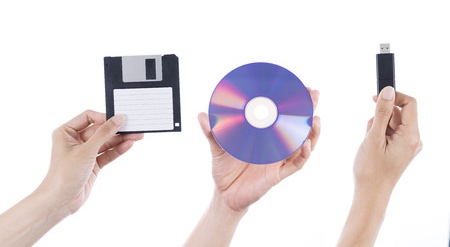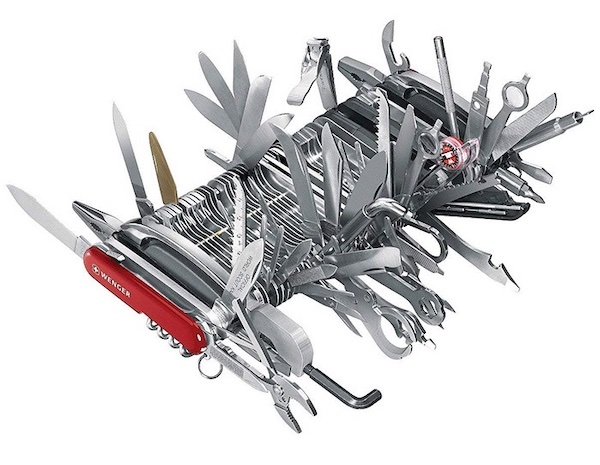Do one thing well
Do you remember your first time using Dropbox? Files instantly sync across your devices and to the cloud. You can move files around just like a normal folder. Dropbox is so simple that you often forget it's running.
Before Dropbox, it was common to carry a usb drive or other storage device (remember ZipDrives?) to sync files from one computer to another. Maybe you ditched the usb drive in favor of emailing yourself files or syncing to an ftp. There were some rudimentary cloud services but they all required multiple steps. Everything felt like a hack.

Dropbox changed all of that. All you had to do was drag a file into a folder and it was instantly available across all of your devices. No websites, no thumb drives. It just worked.
Steve Jobs famously called it "just a feature." That 'feature' has over 600 million users worldwide and continues to grow.
Dropbox has one job: Make your files available everywhere.
It doesn't try to help you edit your videos or images. It doesn't try to convince you to add Dropbox friends and share files together.
Dropbox does one thing and it does it well.
Note: @gem_ray and @vschwid pointed out that dropbox DID one thing well for the first few years and now has become a bloated product. It's hard to stay small.
The alternative: do many things poorly
We live in a world of complicated products. News websites pop up ads and autoplay videos, Google has at least four messaging apps, and our refrigerators can play Doom.

Complicated products have cluttered menus, lengthy FAQ's, and slow due to feature bloat. Teams add so many features that the product fails at the job we hired it for
Our instinct is to add features and complexity. We think that more features unlock more functionality. We believe more is better.
People don't want more features. They want the product to get the job done and get out of their way.
Adding more features makes people stop using your product. Each new feature is “one more thing to learn, one more thing to possibly misunderstand, and one more thing to search through when looking for the thing you want.” -Jakob Nielsen
Software can be simple
Software wasn't complicated in the beginning. One of the founding principles of Unix (which powers OSX) was that individual programs should do one thing (and only one thing) well. Each program serves a single purpose. Copy (cp), Move (mv), and Delete (rm) are individual tiny programs.
"We used to sit around in the Unix Room saying, 'What can we throw out? Why is there this option?'" Wikipedia: The Unix Philosophy
The benefits of doing one thing well:
- Users can describe your product in a single sentence: "Dropbox makes my files available everywhere."
- Your team can narrowly focus on solving a single problem in a way no other company can.
- Less features means your product is less complex and easier to maintain.
- You don't need to invent new lines of business. Growth comes from making it faster and easier to do what your product already does well.
Products that do one thing well:
- iA Writer - Write.
- Dropbox - Sync your files everywhere.
- TikTok - Create viral videos.
- Traeger Grill - Set and hold a temperature.
Great products start with an idea. They solve a specific problem. They scratch an itch.
Some of the best products in the world continue to scratch that itch day in and day out.
How to do one thing well
Look for the thing people do over and over again. Are people sending messages? Filling out time sheets? Sending friends money? This is the core loop of your product. It is the reason people hire your product.
Instead of adding new features or functionality, focus on removing functionality. What's stopping people from getting to your loop? How can you simplify the loop so people can complete it faster? How can you enable more people to complete the loop?
Your entire focus should be making it easier and faster to do the job people hired your product for.
Aspire to the simplicity of Super Mario Bros. There's a reason it remains the best selling video game franchise of all time. The controls are so simple that anyone could pick them up and start playing: Move, Run, Jump.
Do you feel like you're constantly adding features? I'd love to hear more: @bdickason
Get my newsletter. It features simple improvements you can make to improve your day-to-day PM life. From Product Vision/Strategy to Goals and Metrics to Roadmaps and everything in between.
Post last updated: Mar 12, 2021
Posts
-
Take a break May 7, 2021
-
Make it cheap to fail Apr 30, 2021
-
Scarcity = Value Apr 23, 2021
-
Tools are a distraction Apr 16, 2021
-
Strength-Based Teams Apr 9, 2021
-
Small teams win Apr 2, 2021
-
Don't set vision, set direction. Mar 19, 2021
-
Do one thing well Mar 12, 2021
-
Take charge of your promotion Mar 5, 2021
-
Speed is the killer feature Feb 25, 2021
-
How to manage your manager Feb 19, 2021
-
Social thinkers vs. Solo thinkers Feb 11, 2021
-
Stop Writing and start Editing Feb 4, 2021
-
How to make time for strategic thinking Jan 28, 2021
-
How to ship hardware and software Jan 21, 2021
-
Use your damn product Jan 15, 2021
-
The 5 best Product books and posts Jan 8, 2021
-
Gather great feedback from your power users Jan 4, 2021
-
How to spend more time doing work you love Dec 27, 2020
-
Stop wasting time on strategy decks Dec 21, 2020
-
Less chat more writing Dec 2, 2020
-
How to lead strategic discussions Nov 19, 2020